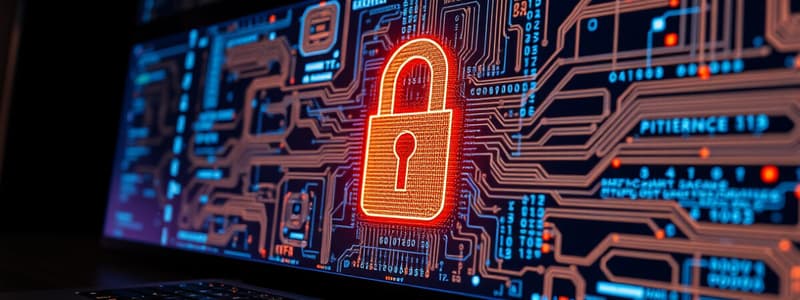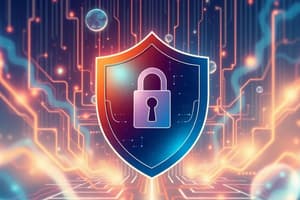Podcast
Questions and Answers
What is one consequence of unauthorized access to data during a security incident?
What is one consequence of unauthorized access to data during a security incident?
- Deletion of data to free up space
- Acquisition of sensitive information for further attacks (correct)
- Data manipulation to improve performance
- Journey of data encryption for security
Which of the following represents a direct consequence for IT systems affected by security incidents?
Which of the following represents a direct consequence for IT systems affected by security incidents?
- Increased availability of services
- Economic benefits for competitors
- Improvement in data security protocols
- Disruption of service operations (correct)
What does ransomware primarily involve during a security breach?
What does ransomware primarily involve during a security breach?
- Destruction of backup systems
- Financial demands for data restoration (correct)
- Infiltration of competitor systems
- Enhanced security features implementation
How can attackers create confusion regarding the attribution of their attacks?
How can attackers create confusion regarding the attribution of their attacks?
Which consequence of a security incident can impact processes outside the directly affected systems?
Which consequence of a security incident can impact processes outside the directly affected systems?
What may lead to further damage in facilities following security breaches?
What may lead to further damage in facilities following security breaches?
What is a potential ongoing risk following the exploitation of a system by attackers?
What is a potential ongoing risk following the exploitation of a system by attackers?
What is essential for preventing, detecting, and mitigating security incidents?
What is essential for preventing, detecting, and mitigating security incidents?
What is meant by the term 'confidentiality' in IT security?
What is meant by the term 'confidentiality' in IT security?
Which of the following is NOT considered a central goal of IT security?
Which of the following is NOT considered a central goal of IT security?
What distinguishes a 'Black Hat Hacker' from a 'White Hat Hacker'?
What distinguishes a 'Black Hat Hacker' from a 'White Hat Hacker'?
Which of the following describes a 'Script-Kiddie'?
Which of the following describes a 'Script-Kiddie'?
What does 'integrity' refer to in the context of IT security?
What does 'integrity' refer to in the context of IT security?
In IT security, what is meant by 'availability'?
In IT security, what is meant by 'availability'?
Which term best describes the inability of the author to deny creation of data?
Which term best describes the inability of the author to deny creation of data?
What differentiates IT security actors into various roles?
What differentiates IT security actors into various roles?
Flashcards are hidden until you start studying
Study Notes
Importance of IT Security
- Essential for the functionality of modern societies.
- Threats to information security come from various actors with different consequences.
- Information is central to IT security, encompassing threat situations, vulnerabilities, successful attacks, and internal security status.
Security Goals
- Confidentiality: Ensures data is accessible only to authorized individuals.
- Integrity: Guarantees that data remains unaltered and identifies any modifications.
- Availability: Ensures that data and services are operational and accessible.
- Non-Repudiation: Confirms that the sender or author cannot deny their ownership of the data.
Key Roles in IT Security
- White Hat Hackers: Skilled individuals who bypass security measures with benign intent or technical curiosity.
- Black Hat Hackers: Malicious individuals who breach security for personal gain, reputation, or to inflict harm.
- Script Kiddies: Inexperienced individuals who use existing software scripts to exploit vulnerabilities without deep understanding.
Consequences of Security Incidents
-
Data-related consequences:
- Unauthorized access leading to exposure of sensitive information and use for further attacks.
- Data manipulation, such as encryption to deny access.
- Data deletion impacting the availability of information and services.
-
Service-related consequences:
- Disruption of service operations, affecting community processes.
- Influence on processes outside the directly impacted systems.
- Malfunctions that cause further damage to infrastructures.
Broader Implications of Attacks
- Ransom Extortion: Demands for money to restore stolen data or cease attacks.
- Industrial Espionage: Illegally obtained information is used for competitive advantages.
- System Compromises: Attacks on additional systems are facilitated by stolen information and access.
- Backdoors: Allow attackers ongoing access to compromised systems.
Challenges in Attack Attribution
- Difficulty in tracing an attack to a specific actor.
- Attacks often originate from compromised computers already controlled by hackers.
- Attackers may mislead investigations through decoys, such as foreign language comments or timing of attacks.
- Reliable attribution is crucial for public accusations and responses to attacks.
- Systematic collection of relevant information is vital for preventing, detecting, and countering attacks.
Studying That Suits You
Use AI to generate personalized quizzes and flashcards to suit your learning preferences.




